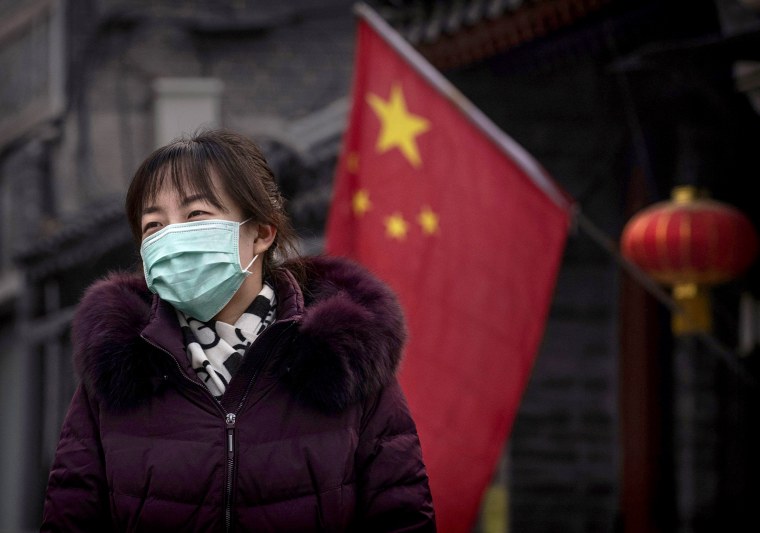As the ripple effects of the Wuhan coronavirus on markets became more evident Monday, with markets seeing their biggest one-day drop of the year so far, experts in Chinese commerce said trade activity and manufacturing could be disrupted, depending on the scope and severity of the disease.
In the short term, businesses like retailers, restaurants, travel and transportation-related companies are expected to lose business, with the outbreak coming during China's biggest travel season of the year.
But it is not just the movement of people that is being curtailed: There are potentially significant ramifications for trade and commerce, since Wuhan is a major river port for freight. Bisected by the critically important Yangtze River, its central location means that consumer goods as well as inputs for manufactured products could be caught in shipping limbo.
"If it lasts longer than four weeks, it becomes a supply chain story," said David Bahnsen, chief investment officer at the Bahnsen Group.
Compared with the SARS outbreak nearly two decades earlier, industrial and manufacturing supply chains today are much more heavily intertwined, both regionally across Asia as well as globally, he said. "You have not only a more sophisticated supply chain, but a larger one."
The Wall Street Journal reported last week that the port, through which 1.5 million containers a year pass, was slowing some vessel traffic as a precaution.
"Depending on the sector, there may be some disruption in supply chains, especially in or near the epicenter of the epidemic," said Doug Barry, spokesman for the U.S.-China Business Council.
Barry noted that the Chinese government has ordered many companies, including manufacturing facilities, in the region to remain closed until Feb. 8. "If the closings extend beyond then, suppliers will be unable to fulfill orders," he said. "Companies have some inventory to draw on, but these reserves will run out in time."
A myriad of cargo types could be affected, spreading the ripple effect across multiple industries. Jacob Kirkegaard, a senior fellow at the Peterson Institute for International Economics, said heavy traffic in industrial goods, raw materials and inputs flows through the affected area.
"Typically, it's the kind of commodities and sectors that rely almost exclusively on river freight," he said. "It's pretty much all boat commodities — agriculture, steel bars, iron ore, coal, chemicals. It can also be larger retail goods, furniture, construction materials. Basically, stuff that is too heavy or bulky to be transported on trucks, that tends to go to the river," he said.
For the time being, Kirkegaard said China's vast electronics manufacturing industry was unlikely to be affected, given that it is much more concentrated in coastal areas that have so far been little affected by the spread of the virus.
But Kirkegaard added one big caveat. "This is predicated on successful containment," he said.
Some say the crisis could even affect trade policy and make it harder for China to fulfill its pledges to buy copious amounts of U.S. agricultural products and energy.
"This will certainly make it difficult to distribute any kind of agricultural products in the interior of China. It was already going to be a reach to attain the goals that were set out in the agreement," Moore said.
Download the NBC News app for breaking news
Since the deal was announced, commodities traders have expressed skepticism that American farmers could even increase production enough to meet the ostensible spike in Chinese demand. "Grain markets weakened and soybeans touched a five-week low as traders awaited confirmation that China has started to buy more U.S. crops," researchers at agricultural research and analysis company Allendale Inc. wrote in a client note last week titled, "Can China Fulfill Lofty Trade Commitments?"
Allendale noted that trade deal pledges to buy more American energy products were similarly outsized. "This would mean China's imports from the U.S. this year would have to be more than double past record monthly imports of U.S.-sourced crude oil, liquefied natural gas and coal," researchers said.
In this way, the humanitarian and public-health crisis of coronavirus could offer a small diplomatic silver lining for policymakers, as the emergency gives both countries a face-saving reason to overlook nonadherence to the terms promised by China. "It may not be a terrible thing for either side," Kirkegaard said
Depending on the ultimate extent of the outbreak, Moore even suggested that the crisis could weaken Beijing's position in the next round of trade negotiations. "If this shaves off more of the GDP growth from what's already some of the worst in decades in China, they've got to be worried about that. It's for China to keep the growth up for political reasons," he said. "This is a lousy way to get negotiating advantages, that's for sure."
On the other hand, experts say the recent phase one trade deal between China and the U.S. gives Washington and Wall Street greater incentive to cooperate with Chinese officials on containing the spread of the virus.
"People in the U.S. [are] seeking ways to help folks on the ground and the Chinese government struggle to deal with this enormous challenge," Barry said. "It is early days in this crisis. Everyone needs to work together to save lives and prevent things from getting worse."
"The U.S. now has a significant incentive to help facilitate China's coping with this because of their enhanced partnership in phase one," Bahnsen said. "Any country that trades with one another has a vested interest in containing one another's health crises."
